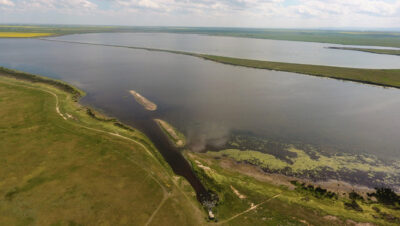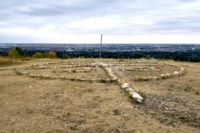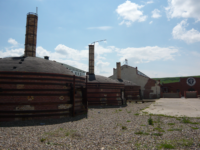New university research focused on wastewater treatment
By Alejandra Pulido-Guzman - Lethbridge Herald on August 11, 2022.
 Submitted photo
An aerial view of Frank Lake, a restored wetland six kilometres east of High River, shows the effluent outflow.
Submitted photo
An aerial view of Frank Lake, a restored wetland six kilometres east of High River, shows the effluent outflow.LETHBRIDGE HERALDapulido@lethbridgeherald.com
University of Lethbridge researchers are seeking a better understanding of the way wetlands work to help treat wastewater, by studying the Frank Lake wetland and its watershed near High River, Alta.
Frank Lake is a restored wetland six kilometres east of High River, managed by Ducks Unlimited Canada, and it is listed as an Important Bird Area.
The research team, Matt Bogard, Steve Wiseman and Larry Flanagan from U of L, Kerri Finlay from the University of Regina and Markus Brinkmann from the University of Saskatchewan, in partnership with Cargill Limited and the Highwood Management Plan Public Advisory Committee, with support from U of L Professor Emeritus Stewart Rood and Peter Leavitt from the University of Regina will embark on a five-year project, with base funding from Cargill Limited and matching funds from the Natural Sciences and Engineering Research Council (NSERC) of Canada Alliance program totalling approximately $1.5 million.
“The goal of this project is to understand the impacts of land use on the health of the Little Bow watershed, with a focus on the role that the Frank Lake wetland plays in processing effluent in this economically important region,” said Bogard in a release.
He added that they want to provide all stakeholders with scientific knowledge and data to help manage the watershed as best as possible.
The concern for stakeholders is how long the Frank Lake wetland can sustain current levels of treatment, and whether actions can be taken to enhance its functioning.
Not only does the wetland provide habitat for birds, it adds another level of effluent treatment by further removing nutrients, salts and other chemicals.
Treated effluent from both the Town of High River and Cargill Limited is released into Frank Lake to maintain water levels.
The wetland is also part of a larger watershed. Frank Lake flows periodically into the Little Bow River, which begins near High River and eventually joins the Oldman River.
Along the way, other communities located within the watershed add effluent, and surrounding land uses include feedlot operations.
“Part of the goal of this project is to tease apart the influence of different land uses on watershed health, so that future management decisions can better evaluate impacts of individual land uses,” said Bogard.
By studying the whole basin, the researchers hope to gain an understanding of how the entire system works.
“Much of the water used by humanity is released back into the environment as wastewater, so this project has major implications for watershed and wastewater management worldwide,” said Bogard.
The researchers will examine nutrient cycling in the watershed, water quality, aquatic ecology, health of the wetland and surrounding vegetation, and effluent toxicity.
Follow @APulidoHerald on Twitter
17-16




